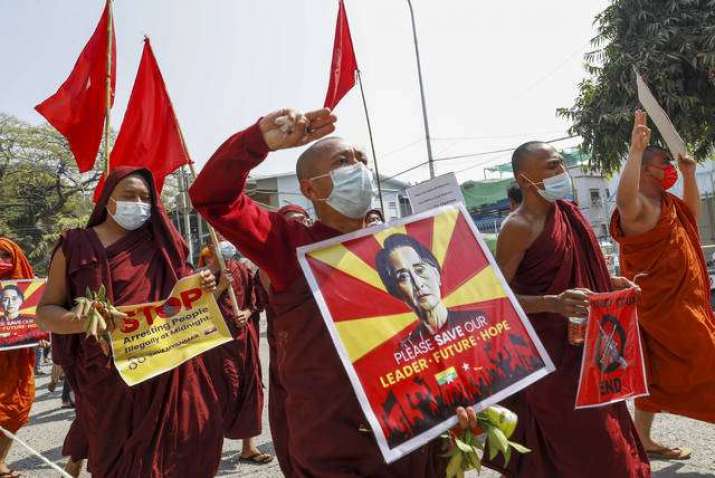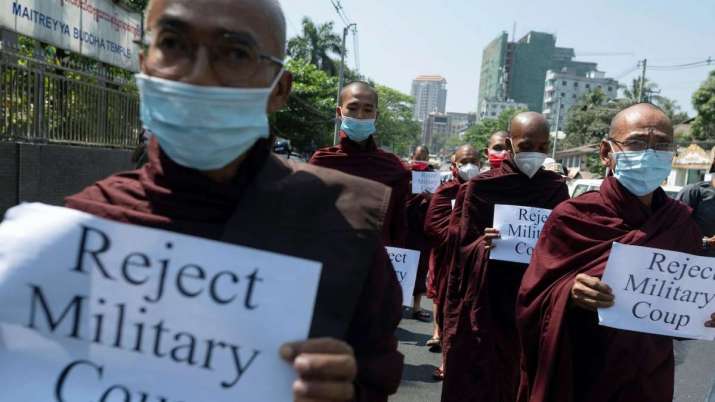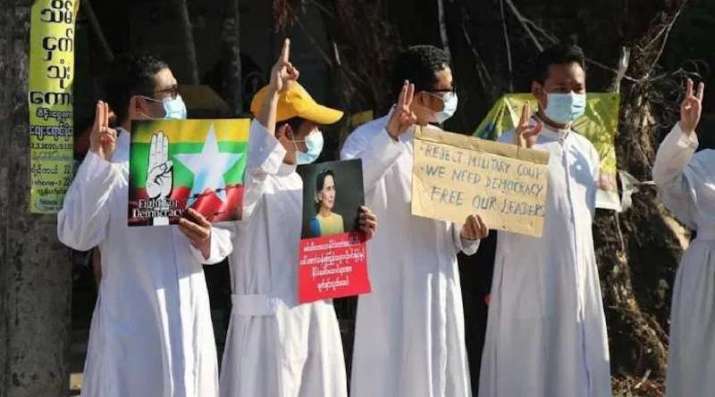NEWS
Buddhist Monks March in Opposition to Military Coup in Myanmar
 Buddhist monks and nuns protest in Mandalay on Tuesday. From triblive.com
Buddhist monks and nuns protest in Mandalay on Tuesday. From triblive.comGroups of Buddhist monks took to the streets of Myanmar’s two largest cities, Yangon and Mandalay, on Tuesday, marching in protest against the military takeover of the country’s government and calling for the release of ousted State Counselor Aung San Suu Kyi.
Speaking to foreign media in Yangon (formerly Rangoon), the monks called on local residents and the international community to support the pro-democracy movement. “I would like to request that all citizens help eliminate the power of the military dictatorship until we can get rid of this system,” one of the monks, Sandar Thiri, was quoted as saying. (Reuters)
The monastics, who were reported to number between 30 and 50 in Yangon, carried signs and banners in English reading “reject military coup,” and “monks who don’t want a military dictatorship.” They marched alongside hundreds of civilian protesters from the 120-year-old Nga Htat Gyi Buddhist pagoda to the United Nations office in Yangon.
Public protests in Yangon, which had eased in recent days amid a concerted crackdown by security forces, surged sharply again on Wednesday.
 Buddhist monks march to the UN office in in Yangon. From asia.nikkei.com
Buddhist monks march to the UN office in in Yangon. From asia.nikkei.comBuddhist monastics, venerated throughout Burmese society, are highly influential in Myanmar (formerly Burma), a predominantly Theravada Buddhist country in which 88 per cent of the population of roughly 60 million people identify as Buddhists, according to census data for 2014. Buddhist monastics stood at the forefront of pro-democracy protests against the previous military junta in 2007, a movement known as the “Saffron Revolution,” which helped to bolster grassroots support. Buddhist monks in this Southeast Asian nation are estimated to number in excess of 500,000, mainly centered in Yangon and Mandalay, with some 75,000 Buddhist nuns.
As well as Buddhist monks, representatives of Myanmar’s Christian, Muslim, and Hindu communities have also been participating in the nationwide pro-democracy movement, with priests, nuns, and seminarians demonstrating solidarity by holding placards and banners in front of churches.
Myanmar’s military declared a year-long state of emergency on 1 February, after detaining President Win Myint, State Counselor Aung San Suu Kyi, and other senior members of the governing National League for Democracy (NLD) party. The coup d’état took place just hours before the country’s new parliament was due to convene following a general election in November last year, during which the NLD made substantial electoral gains.*
Suu Kyi, who served the country from 2016–21, following a long struggle for democracy that overturned decades of military rule, remains under house arrest and is facing a growing litany of charges from the coup leaders in an apparent attempt to provide a legal veneer for her detention. Before leading the civilian government, Suu Kyi, now 75, spent almost 15 years under house arrest for her efforts to bring democracy to Myanmar.
The military, which had backed the parliamentary opposition in the national election, has asserted that it staged the coup in response to electoral fraud, however the national election commission has said there is no evidence to support these claims. The NLD won around 80 per cent of the available parliamentary seats in last year’s vote.
Since seizing power, the self-styled State Administration Council (SAC), led by military commander-in-chief General Min Aung Hlaing, has already unilaterally amended the country’s treason and sedition legislation in an apparent bid to secure impunity for the coup leaders.
 Catholic priests hold a picture of State Counselor Aung San Suu Kyi during an anti-coup protest in Pathein, Irrawaddy Division, on 10 February. From eurasiareview.com
Catholic priests hold a picture of State Counselor Aung San Suu Kyi during an anti-coup protest in Pathein, Irrawaddy Division, on 10 February. From eurasiareview.comA nationwide civil disobedience movement (CDM) has quickly gathered pace in the wake of the coup, with hundreds of thousands of people protesting in towns and cities across the country, denouncing the military and calling for the release of detained civilian leaders. The CDM movement, which began with medical personnel, has since been taken up by teachers, engineers, railway workers, bank staff, and even some members of the police, who have switched sides to join the protestors.*
The military-led insurrection has been characterized by internet blackouts, violent crackdowns, and intimidation. Since the pre-dawn coup on 1 February, the military has reportedly detained almost 500 people, including pro-democracy politicians, election officials, student leaders, celebrities, and journalists—many of whom were reported to have been taken from their homes in overnight raids.
Eleven members of the Myanmar Press Council, a media adjudication body that investigates and resolved press disputes, and more than a dozen journalists at The Myanmar Times newspaper have resigned in response to military attempts to censor media criticism. On 13 February, the military issued a series of directives for journalists, which include instructions not to use the terms “regime” or “junta” in reference to the SAC.
In Picture: An anti-military regime protest column made up of people from #Myanmar’s different ethnicities marched through downtown Yangon on Thursday, calling for the release of anyone detained by the regime and the end of the military dictatorship. #rejectmilitarycoupmyanmar pic.twitter.com/e0GURO1jb7
— The Irrawaddy (Eng) (@IrrawaddyNews) February 18, 2021
* Peace Sangha Union Issues Statement on Myanmar Coup as Buddhist Monks Join Pro-democracy Protests, UPDATE: INEB Calls for Reconciliation in Myanmar as Pro-democracy Protests Turn Violent, and The Other Shoe Drops: Reflections on Myanmar’s Latest Coup (Buddhistdoor Global)
See more
Myanmar monks on the march, call for end to military rule (Reuters)
Monks join Myanmar rally, demanding release of Suu Kyi (Nikkei Asia)
Saffron Revolution monks march to UN office in Myanmar protest (MSN News)
Myanmar: Religions Unite Behind Anti-Coup Protests (Eurasia Review)
Myanmar’s Suu Kyi faces new charge as crackdown intensifies (Trib Live)
Myanmar Journalists Leave Jobs in Face of Military Regime Restrictions on Media Freedom (The Irrawaddy)
Myanmar Ruling Council Amends Treason, Sedition Laws to Protect Coup Makers (The Irrawaddy)
Six More Myanmar Celebrities to Face Arrest for Support of Civil Disobedience Movement (The Irrawaddy)
Despite Pressure, Myanmar Govt Employees Refuse to Work Under Military Rule (The Irrawaddy)
International Network of Engaged Buddhists
Peace Sangha Union - PSU 2021 (Facebook)
International Campaign for the Rohingya (The Action Network)
Burma Campaign UK
Burma Task Force
Justice for Myanmar
Related news from Buddhistdoor Global
UPDATE: INEB Calls for Reconciliation in Myanmar as Pro-democracy Protests Turn Violent
Peace Sangha Union Issues Statement on Myanmar Coup as Buddhist Monks Join Pro-democracy Protests
Engaged Buddhism: JTS Korea Donates COVID-19 Relief Supplies to Myanmar in Cooperation with INEB and KMF
Fugitive Nationalist Buddhist Monk Surrenders to Police in Myanmar Ahead of Poll
Rohingya Refugees Raise Funds to Help Displaced Buddhists in Myanmar’s Rakhine State
Rakhine Community in Bangladesh Protests Myanmar’s Military Aggression in Rakhine State
Myanmar’s Military Seeks to Jail Buddhist Monk over Criticism
Buddhist Monk Stands Firm Against Hatred and Violence in Myanmar
Interfaith Activists in Myanmar Defy Anti-Muslim Nationalists with #WhiteRose4Peace Campaign
Buddhist Peace Organization Issues Open Letter Decrying Treatment of Myanmar’s Rohingya
American Buddhist Teachers Issue Letter to Myanmar Leadership Urging Peace
Aung San Suu Kyi Urges Tolerance and Unity in Myanmar’s Troubled Rakhine State
Related features from Buddhistdoor Global
The Other Shoe Drops: Reflections on Myanmar’s Latest Coup
Sea of Suffering: The Rohingya and the Conundrum of Buddhist Terror
Buddhistdoor View: Reconciling Nationalism and Buddhism














